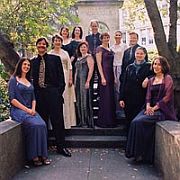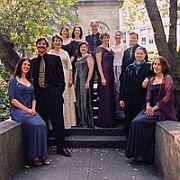
Heinrich Schütz suggested that his Musikalische Exequien could be a substitute for a German mass. Warren Stewart has taken him at his word, incorporating the work into a full-length church service. Stewart’s Magnificat, complete with two organs, a continuo group, and eight singers (including a preacher and a deacon), performed the mass Saturday night at St. Mark’s Episcopal Church in Berkeley. The so-called audience served as congregation, joining in on some verses of the chorales.
Nowadays, chorales are called hymns, and in American churches are usually sung in English. The congregation was invited to applaud at the end, but that increasingly happens routinely in American church services. And lo, nobody was turned away for not singing or not knowing German or not caring much for sermons. In fact, the congregation seemed to enjoy singing chorale verses and listening to the more elaborate verse settings. Preacher Hummel chanted the Epistle and spoke the sermon in German, risking encouragement of the traditional practice of sleeping through the sermon.
Schütz, born a hundred years before J.S. Bach, was a prolific composer. Greatly esteemed in his own time, he retained a sort of connoisseurs’ fame long after musical tastes had changed, and now his music — all available in good modern editions — is as highly regarded as it ever has been.
A Splendid Team, Artfully Deployed
The Musikalische Exequien is a masterwork, and Magnificat gave it superb voice. Every singer rose magnificently to the occasion: tenor Martin Hummel (the preacher) and bass Hugh Davies (the deacon), tenor Paul Elliott and bass Peter Becker, altos Daniel Hutchings and Kristen Dubenion Smith, and sopranos Ruth Escher and Jennifer Paulino.
The work (whose opening was preceded by unison chanting of an introit from the Psalms) began with the extraordinary “Nakket bin ich von Mutterleibe kommen” (Naked I came out of my mother’s womb). The tenor preacher began with a solo line, to be joined by the other male voices, followed by the full sextet, then by a two-soprano duet. And so the music continued, weaving from the eight distinctive voices a tapestry of small ensembles, flashes of solo singing, and full choral sound, and ending on a text by Martin Luther with all eight singers.
“Exequien” (obsequies) are burial masses, but this mass was commissioned by the widow of Prince Heinrich Reuss Posthumus, and the text was not the usual mass, but rather a collection of scriptural verses from both Old and New Testaments, plus quotations from several Protestant leaders, Luther prominent among them. One of my personal favorite moments in the great feast of sound was a duet by the two basses, who sang of life’s labor and sorrow but “delighted therein.” And the Messiah-singing soprano in me was charmed by a tenor rendition of the German text that translates as “I know that my Redeemer liveth.”
Schütz included two motets in the Musicalische Exequien. The singers moved into two quartets to sing the polychoral “Herr, wenn ich nur dich habe” (Lord, if I only have you). The second motet was a setting of two separate texts. From the front of the church a quintet (altos, tenors and one bass) sang “Lord, now let Thy servant depart in peace,” and at the back, two sopranos and a bass sang “Blessed are the dead which die in the Lord” — a lovely antiphonal moment.
The continuo players were Katherine Heater on organ, John Dornenburg on violone, and David Tayler on mandora (a kind of lute). Davitt Moroney, at the back of the sanctuary, played the splendid St. Mark’s Flentrop organ. He provided elaborate chorale introductions by Scheidt, Schein and Praetorius, and began and ended the service with a ricercar prelude and a toccata postlude, both by Johann Jacob Froberger.

